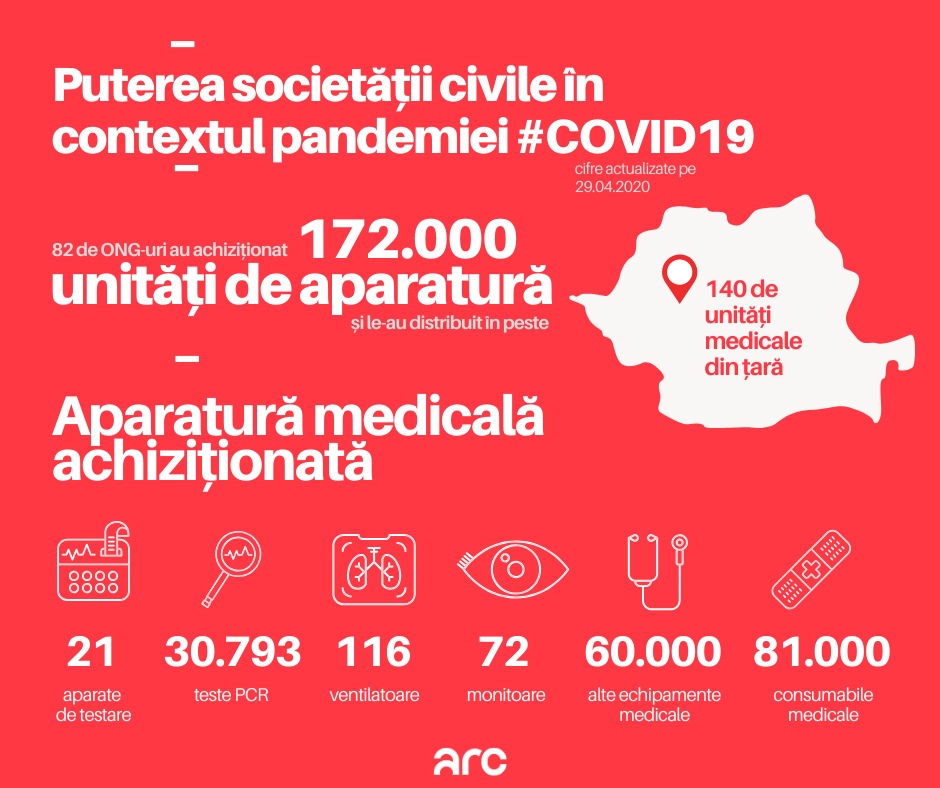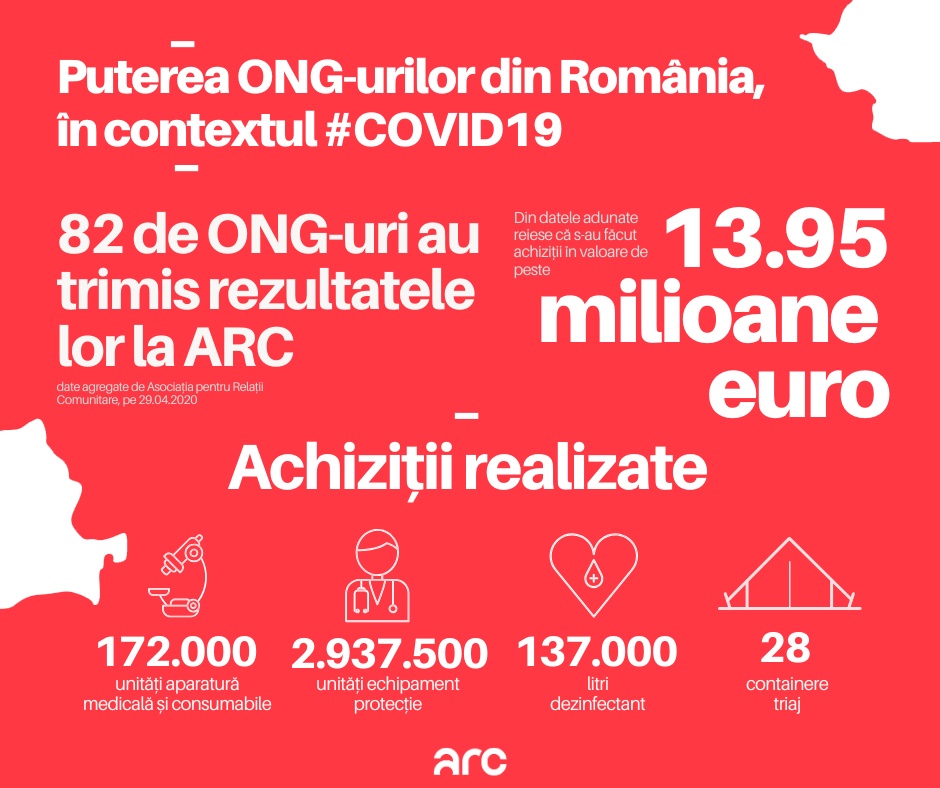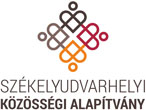
In Romania, the civil society provided € 14 million worth of equipment and appliances to hospitals and supported thousands of people at the forefront in each county.
- More than 140 medical units received support from NGOs.
- More than 80 NGOs purchased protective equipment and medical equipment worth more than
€ 13.95 million.
Press release:
Asociația Dăruiește Viață, Asociația pentru Relații Comunitare, Asociația Zi de Bine, Casa Share, Cetatea Voluntarilor Arad, Dăruiește Aripi, Federația Fundațiile Comunitare din România, Fundația Comunitară Alba, Fundația Comunitară Bacău, Fundația Comunitară Banatul Montan, Fundația Comunitară Brașov, Fundația Comunitară București, Fundația Comunitară Buzău, Fundația Comunitară Cluj, Fundația Comunitară Covasna, Fundația Comunitară Dâmbovița, Fundația Comunitară Galați, Fundaţia Comunitară Iaşi, Fundația Comunitară Mureș, Székelyudvarhelyi Közösségi Alapítvány – Fundația Comunitară din Odorheiu Secuiesc, Fundația Comunitară Oradea, Fundația Comunitară Prahova, Fundația Comunitară Sibiu, Fundația Comunitară Timișoara, Fundația Comunitară Țara Făgărașului, Fundația Comunitară Vâlcea, Fundația Prețuiește Viața, MagiCAMP, Salvați Copiii România, VeDem Just – Voci pentru Democraţie şi Justiţie.
“There is no mask at all. They started sterilizing them. ”,“ Arad could be Suceava in a few days. ”,“ We have a single ultraviolet lamp throughout the department that we use in a row. ” – This is what most of the messages that have been received by NGOs since the beginning of the COVID-19 epidemic sound. While the authorities declare that the medical units are ready, NGOs have prepared the first delivery of donations for them.
Since the onset of the COVID-19 pandemic, NGOs have been actively involved in equipping hospitals and protecting medical personnel. Many NGOs have launched new campaigns or modified their ongoing projects to raise funds to protect communities.
Thus, data from more than 80 organizations that have completed the Association for Community Relations questionnaire show that more than € 13.95 million worth of medical equipment and devices were purchased in just 7 weeks. The amount is derived from the calculation of the Association for Community Relations and is based on data provided by these organizations.
In Romania, dozens of other organizations have also been involved to help doctors and hospitals in this crisis, whose contributions are not included in these figures, but which have had a significant impact on the myriad communities affected by the pandemic. It is also worth mentioning the key role that many other organizations play in supporting vulnerable groups and will do their utmost to fulfill their mission and continue to support beneficiaries, despite the epidemiological situation.
The figures show the impact of the civil sphere in times of crisis, as well as the unity and support of the people, that they can help through the donations they provide. Donors believe that we are able to find solutions, and companies see us as partners who can bring local and national change.
- Amount raised by NGOs: € 14 million
- Amount spent on appliances and equipment: € 13.95 million
- Fans: 116
- Test equipment: 21
- PCR tests: 30,793
- Monitors: 72
- More than 60,000 medical devices (injectors, panels, pulse oximeters, disinfection tunnels, sterilization lamps, defibrillators, etc.)
- Medical consumables: approx. 81,000
- Protective clothing: more than 41,500
- Surgical masks: more than 1.5 million
- Filter masks: 455,000
- Eye protectors and goggles: 66,000
- Gloves: approx. 875 000
- Disinfectant: 137,000 liters
- 28 containers (container)
- Other protective equipment: more than 60,000 (boots, hats, sheets, disposable protective clothing, etc.)
- More than 10 tons of food and hygiene products for health care staff, patients, quarantined people, isolated people, the elderly, people from social centers, etc.
- The support of the organizations reached all over the country.
With the help of the civil sphere, the ability to test endangered locations such as Iași, Nădlac, Deva or Timisoara has increased; with the help of these organizations, more than 30,000 PCR tests arrived at the hospital. It also increases the ability to treat COVID-19 patients by setting up modular hospitals. In order to make everyone’s effort as effective as possible and to cover as many urgent needs as possible, professional, peer-to-peer cooperation between the state and the civil sphere is needed.

Based on the trust in their work and the good knowledge of the community, the civil sphere was able to engage quickly and significantly and give the state time to intervene at the national level. Therefore, these signatory organizations require the authorities to:
- Cooperate with the civil sphere as transparently as possible;
- The needs of hospitals and high-risk medical units (psychiatric centers, dialysis centers, oncology, etc.) should be communicated so that NGOs and public authorities can coordinate their efforts and avoid duplication of work;
- Mutual support in the procurement process (logistical, diplomatic support). Together we can order more equipment at a lower price from a single manufacturer;
- Making the borders of EU Member States and non-EU countries interoperable for medical orders from NGOs;
- Recognition of the significant influence of the civil sphere during this period;
- Adoption of a package of supporting non-governmental organizations affected by the pandemic (KKV model).
”In recent weeks, NGOs, civic groups and business people from across the country have launched initiatives to support the health system with the aim of improving its ability to cope with the social impacts of the coronavirus epidemic. To ease the growing demands, 17 Romanian community foundations called out local businesses and individuals to show solidarity in these critical times. Thus, mobilizing around € 1.5 million, purchasing protective equipment, medical equipment and disinfectants for Romanian hospitals, and on the other hand, providing support to vulnerable groups, strengthening social ties in communities.”
The Association of Romanian Community Foundations was founded in 2012 and its role is to represent the interests of the Romanian community foundations at the state level, which contribute to the development of conscious, generous, inclusive and sustainable communities that can develop together, involving various local actors.
Community Foundations that are members of the association: Alba County, Bacau, Brasov, Bucharest, Cluj-Napoca, Covasna, Dâmbovița, Galați, Iași, Mureş, Odorheiu Secuiesc, Oradea, Prahova, Sibiu, Timisoara, Fogaras.
Recently established Community Foundations: Banatul Montan, Buzău, Vâlcea


